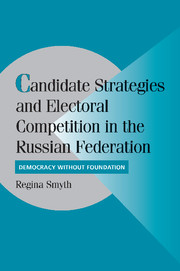 Candidate Strategies and Electoral Competition in the Russian Federation
Candidate Strategies and Electoral Competition in the Russian Federation Book contents
- Frontmatter
- Contents
- 1 ELECTIONS AND THE DEVELOPMENT OF DEMOCRATIC CAPACITY
- 2 ONE STEP FORWARD, TWO STEPS BACK: RUSSIA'S FAILED CONSOLIDATION IN COMPARATIVE CONTEXT
- 3 THE MICROFOUNDATIONS OF DEMOCRATIC RESPONSIVENESS: CANDIDATE STRATEGIES AND ELECTORAL INFRASTRUCTURE
- 4 MANY CANDIDATES, FEW CHOICES
- 5 TO JOIN OR NOT TO JOIN: CANDIDATE AFFILIATION IN TRANSITIONAL RUSSIA
- 6 FINDING FIT: CANDIDATES AND THEIR DISTRICTS
- 7 CAMPAIGNING FOR THE DUMA: MIXED MARKETS, MIXED MESSAGES
- 8 DEMOCRATS, DEMOCRATIC TRANSITIONS, AND RUSSIAN DEMOCRACY
- Appendix A The Sample
- Appendix B The Candidate Survey
- Appendix C Variables Constructed from Survey Data
- Appendix D Sample and Variable Construction for Analysis in Chapter 2
- Works Cited
- Index
- Cambridge Cultural Social Studies
8 - DEMOCRATS, DEMOCRATIC TRANSITIONS, AND RUSSIAN DEMOCRACY
Published online by Cambridge University Press: 25 July 2009
- Frontmatter
- Contents
- 1 ELECTIONS AND THE DEVELOPMENT OF DEMOCRATIC CAPACITY
- 2 ONE STEP FORWARD, TWO STEPS BACK: RUSSIA'S FAILED CONSOLIDATION IN COMPARATIVE CONTEXT
- 3 THE MICROFOUNDATIONS OF DEMOCRATIC RESPONSIVENESS: CANDIDATE STRATEGIES AND ELECTORAL INFRASTRUCTURE
- 4 MANY CANDIDATES, FEW CHOICES
- 5 TO JOIN OR NOT TO JOIN: CANDIDATE AFFILIATION IN TRANSITIONAL RUSSIA
- 6 FINDING FIT: CANDIDATES AND THEIR DISTRICTS
- 7 CAMPAIGNING FOR THE DUMA: MIXED MARKETS, MIXED MESSAGES
- 8 DEMOCRATS, DEMOCRATIC TRANSITIONS, AND RUSSIAN DEMOCRACY
- Appendix A The Sample
- Appendix B The Candidate Survey
- Appendix C Variables Constructed from Survey Data
- Appendix D Sample and Variable Construction for Analysis in Chapter 2
- Works Cited
- Index
- Cambridge Cultural Social Studies
Summary
The period following founding elections, usually referred to as democratic consolidation, is distinct from the other periods of political transition. Electoral competition generates a new focus for political action, one where winning votes is the gateway to policy outcomes or power. Elections can profoundly transform the relative influence of individuals and groups as well as political resources that survived the authoritarian regime or emerged in the democratization period. Elections can also provoke the emergence of new actors or the dissolution of existing ones. As a result of these shifts, the politics of the post-election period is distinct from the previous liberalization and democratization periods.
Conventional wisdom argues that the politics of early electoral contests tends to be fierce and unpredictable, followed by a period of learning or adaptation, as individual and collective actors decode the new system and the effects of their own strategies in pursuit of political goals. We expect that these processes strengthen democratic governance. Yet, the Russian case illustrates that candidates' adaptations to electoral institutions need not generate investment in electoral infrastructure or democratic development. Russian candidates were extremely adroit at choosing strategies that protected their own interests in the electoral process, but did not lead to a successful democracy.
At the national level, the Russian case demonstrates that the outcomes of consolidation periods also can be surprising and lead to a long period of instability or an outright failure to solidify representative and accountable democracy.
- Type
- Chapter
- Information
- Candidate Strategies and Electoral Competition in the Russian FederationDemocracy without Foundation, pp. 197 - 212Publisher: Cambridge University PressPrint publication year: 2006


